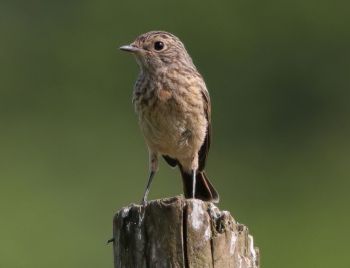- Saxicola rubicola
Identification
Male
- Black head
- White half-collar
- Black back
- White rump
- Black tail
- Black wings with a large white patch on the top side of the inner wing
- Dark orange-red upper breast
- White or pale orange lower breast and belly
Females
- Brown above and on head
- Indistinct pale eyebrow line
- Chestnut-buff underparts
Distribution
Found in Europe (mainly S and W), northwestern Africa and Turkey.
Taxonomy
Formerly included in Common Stonechat together with African Stonechat and Siberian Stonechat.
Subspecies
Two subspecies recognized[1]:
- S. r. hibernans:
- S. r. rubicola:
Habitat
Open rough scrubland and rough grassland with scattered shrubs.
On migration may be found in drier areas.
Behaviour
Most often seen in pairs perched up on a stick or shrub. It flies down onto the ground, returning to the same perch. Often flicks its wings.
Diet
This species eats mainly insects and worms.
Breeding
The nest is well hidden inside a clump of vegetation and consists of an untidy bowl of grass and rootlets. It is lined neatly with rootlets and animal hairs. Four to six eggs are laid and there may be two broods.
References
- Clements, J. F., T. S. Schulenberg, M. J. Iliff, D. Roberson, T. A. Fredericks, B. L. Sullivan, and C. L. Wood. 2015. The eBird/Clements checklist of birds of the world: v2015, with updates to August 2015. Downloaded from http://www.birds.cornell.edu/clementschecklist/download/
- BirdLife International
- The Observer's Book of Birds' Eggs ISBN 0723200602
Recommended Citation
- BirdForum Opus contributors. (2024) European Stonechat. In: BirdForum, the forum for wild birds and birding. Retrieved 25 April 2024 from https://www.birdforum.net/opus/European_Stonechat
External Links
GSearch checked for 2020 platform.1







